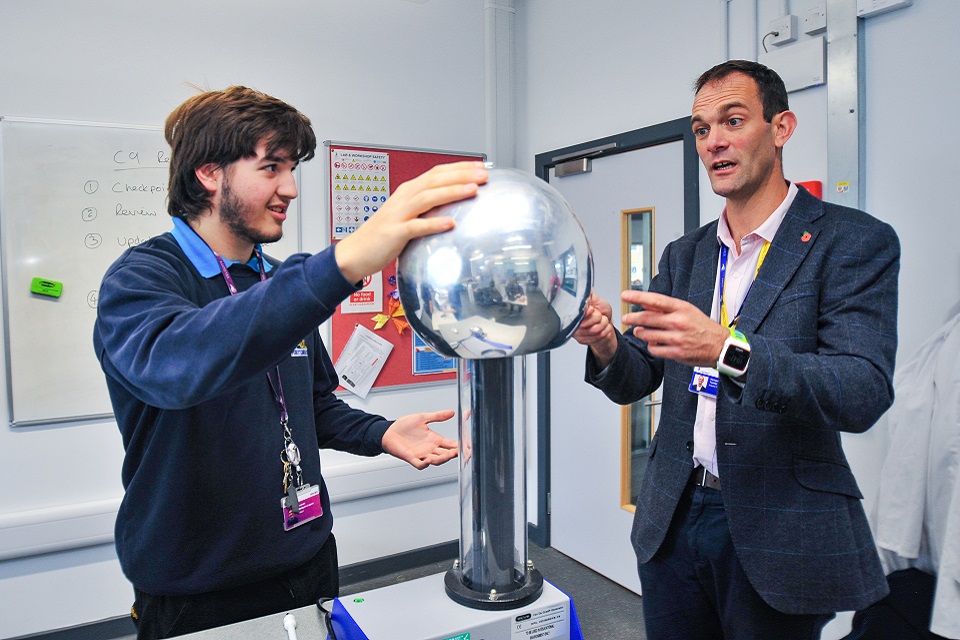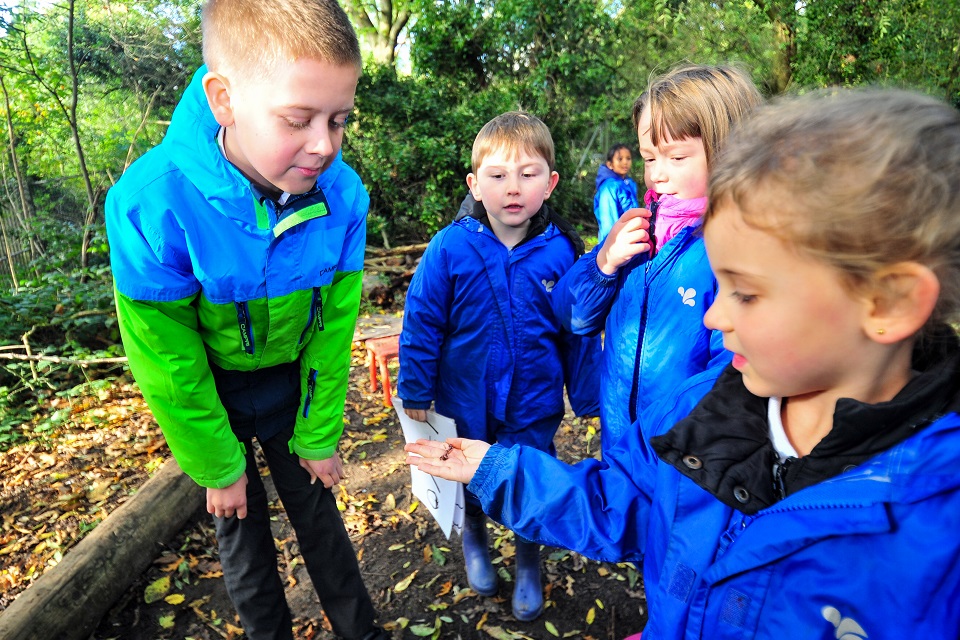Ofsted strategy 2022–27
Published 26 April 2022
Applies to England
Introduction

Ofsted aims to improve lives by raising standards in education and children’s social care. We inspect and regulate thousands of organisations and individuals providing education, training and care – from childminders to training providers, schools to local authorities – and we share what we find.
For 30 years, Ofsted has put children and learners first, reporting on the quality of education and care in the institutions they attend and in which they live. Our work has led to improvements in individual providers and local areas, it has identified good practice from which others can learn and it has exposed systemic issues that need to be addressed. Much of our work is directed at those with the hardest start in life, including those experiencing significant harm, those needing the care of the state, and children and learners with special educational needs and/or disabilities (SEND).
Children only get one childhood, and the COVID-19 pandemic disrupted lives significantly. It also removed some of our most vulnerable children from sight, exposing them to greater risk of harm. Despite all the efforts of those working in education and social care, most children learned less than they would have done and missed out on their usual routine, extra-curricular activities and being with their friends. Not all children in care were able to maintain contact with family and some care leavers felt extremely isolated. Physical and mental health were affected across age groups. Learners in further education and skills, especially apprentices and those with practical elements to their courses, suffered great losses to their education, as did prisoners.
Ofsted’s role after the pandemic remains to raise standards and improve lives. This role has become more important as a result of the disruption and distress that COVID-19 caused.
2022–27 strategy: evolution

Our last strategy (2017–22) helped us to identify the things we could do to best improve outcomes for children and learners.
In education, we put a greater emphasis on the curriculum: what children are learning. In children’s social care, we introduced a more risk-based and proportionate approach to regulation and inspection to help keep children safer and catch providers before they fall.
Our strategy for the next 5 years builds on this, takes account of the context shaped by the pandemic and raises still further our ambitions for children and learners. Ofsted’s mantra of ‘raising standards, improving lives’ has never been more important.
Our guiding principle

We are a force for improvement through the intelligent, responsible and focused use of inspection, regulation and insights.
We use the phrase ‘a force for improvement’ to recognise that Ofsted’s work does lead to improved standards, but we are just one of many actors in education, training and care. We are not an ‘improvement agency’ – improvements are made by teachers, leaders, social workers and others who work on the ground – but our inspection, regulation and insights contribute to these improvements.
Being ‘intelligent’ means making sure that our work is evidence-led and that our frameworks and regulatory approaches are grounded in what works best to improve outcomes for children and learners.
Being ‘responsible’ means understanding the perverse incentives and unintended consequences our work can have, and minimising those as far as possible. Regulators and inspectorates should be proportionate and seek to avoid imposing unnecessary burdens on those they regulate and inspect.
Being ‘focused’ means directing our resources to the areas that have the most impact and where children and learners are most at risk. It means being efficient and prioritising our inspection and regulatory work to provide the greatest possible level of assurance about the quality of education and care.
Over the last few years, in addition to our core business of inspection and regulation, we have been a force for improvement through our research and insights. We are required by law to advise the Secretary of State on the state of education and children’s social care and to report annually to Parliament. We are in a unique position to see what is happening on the ground and we use that intelligence to identify trends, highlight issues that need addressing and share good practice that others can learn from. We have reflected the importance of this work in our guiding principle.
Our values
We have 4 values that inform everything we do:
Children and learners first
Our focus is on improving outcomes for children and learners. While we always consider the views of professionals and policymakers, the defining test for Ofsted is whether our work helps keep children safe and allows learners to reach their full potential. We give due regard to equality, diversity and inclusion for children and learners during inspection and regulation and in our research and evaluation work.
Independent
We judge standards and report our findings to the public without fear or favour. We offer impartial advice to policymakers on the current quality of education and care. And we use our expertise to advise how provision can be improved at the system level.
Accountable and transparent
We report to Parliament on how we carry out our inspection and regulatory functions and how we spend taxpayers’ money. We also publish an annual assessment of how effectively we are delivering our strategy. We are transparent: our approach to regulation and inspection is open to scrutiny.
Evidence-led
Our policies, frameworks, judgements and insights are rooted in evidence. We are proportionate and responsible in how we use our voice, providing the evidence to highlight significant issues.
Strategic priorities
To fulfil our aims, we have set 8 strategic priorities:
Inspections that raise standards

Our inspections will help education and social care recover and improve.
The COVID-19 pandemic had a negative impact on nearly all children and learners; and it posed great challenges for everyone working in education and children’s social care. Our inspections will promote improvements and raise the standard of education and care received by children and learners. Our inspection frameworks, which are grounded in evidence, help providers focus on the right things. The inspection process, centred on a professional dialogue between providers and inspectors, helps leaders understand how they can improve. Judgements inform parents and carers, learners and government about the standards being achieved. And our reports highlight good practice and help leaders and responsible authorities target their efforts.
We will:
- accelerate the inspection cycle so that all schools are inspected by July 2025
- allow more time for professional dialogue and evidence-gathering by increasing the proportion of longer inspections in education
- assess all colleges on how well they are meeting the skills needs of the economy within the next 4 years
- clearly identify how local authorities support care leavers
- inspect all parts of teacher education – from initial teacher education, to early career teacher development, to professional qualifications
- enhance our inspections of independent schools, so swift intervention can happen where standards are poor
- evaluate the performance of our inspection frameworks, including the education inspection framework (EIF)
As a result:
- over 90% of providers will agree that their inspection will help them improve standards
- 9 to 12 months after an inspection, most providers will agree that they made changes to improve standards
- increasing numbers of colleges will agree that our inspections and guidance help them better match their offer to skills needs in the economy
Right-touch regulation

Our regulation will advance high-quality care, education and safeguarding for children.
Proportionate and risk-based regulation of early years and children’s social care is critical to ensuring good outcomes for children. We follow the principles of good regulation: proportionality, accountability, consistency, transparency and targeting. We put the interests of children at the heart of our work, checking that providers are achieving high standards of care, while using the appropriate regulatory force required to achieve our objectives. Our comprehensive risk assessments mean we concentrate resources on the areas that need them most, only intervening where there is a clear case for doing so. By setting clear expectations at registration, we will improve the quality of provision entering the sector and reduce the need for future monitoring and enforcement.
We will:
- improve the quality of providers entering the sectors, reducing the need for future monitoring and enforcement
- review our social care inspections in light of the recommendations of the independent care review and the government’s response
- simplify the regulatory regime for childminders
- from 2023, register and regulate settings where children in care and care leavers are supported to live independently
- develop and implement a new casework system that will improve our oversight and regulatory decision-making
As a result:
- more providers demonstrate good or outstanding leadership and management from the start, with fewer judged less than good at their first inspection and a reduction in repeated enforcement action
- our enforcement decisions will be consistent and proportionate, evidenced by reviews of regulatory and inspection reports and activity
- more childminders will agree that the benefits of their inspection outweigh any negative aspects
Making the most of our insights

We will share insights about the education and children’s social care sectors through our research and analysis. Our insights inform practitioners, policymakers and decision-makers and lead to improvements across the system.
We have a unique view of the education and care system, through the hundreds of inspections and regulatory visits we carry out every week. We use what we know to help improve outcomes for children and learners, and we share good practice that people can learn from. Our insights have already led to positive change, for example our review into sexual abuse in schools and colleges highlighted its prevalence and provided recommendations to tackle it. Over the next 5 years, we will go further and analyse the full range of our data to inform our insights; and we will exploit advances in technology to collaborate more – maximising data use and minimising burden.
We will:
- analyse the full range of data that we hold to inform our insights
- share insights to inform decision-makers and practitioners, including insights on the long-term impact of the COVID-19 pandemic on children and learners
- fill gaps in knowledge by carrying out rigorous research and analysis in the areas that we are well placed to generate new insights in, such as multi-academy trusts (MATs), sufficiency in children’s social care and alternative provision
- build understanding of the quality of subject teaching by creating ‘state of the nation’ subject reports based on evidence from inspections and wider literature
- collaborate with other organisations to broaden the data we can analyse, learn from other experts and make our own data as accessible as possible
As a result:
- practice will improve because stakeholders and inspectors use our insights, with an increase in the percentage of stakeholders who have read and used our research
- our insights will be accessed widely, evidenced by more downloads and views of our research, evaluation and statistics
The best start in life

We will develop the evidence base about early years education, including curriculum and pedagogy, and act on it.
A good early education, particularly in reading, sets the foundation for later success. There is a strong statistical relationship between early childhood experiences and a range of life outcomes, from educational success to well-being and good health. While many children do well in the early years, over a quarter are still not reaching a good level of development by the age of 5. Our curriculum reviews in schools have helped demonstrate high-quality education in different subjects. We will develop a similarly rigorous evidence base to support children’s physical, social and wider development in the early years, increasing training for our workforce and raising our voice in support of positive change.
We will:
- develop the evidence base around the early years learning and development curriculum through our research and insights programme
- develop specialist training on early years education for our workforce to enhance their understanding of what high-quality early education looks like
- raise awareness and promote a better understanding of education and care in children’s early years
As a result:
- early years practice will improve because practitioners use our research, evidenced by feedback from focus groups with the sector
- the percentage of early years leaders who agree that communication from Ofsted has informed their practice will increase
Keeping children safe

We will promote children’s safety and welfare in everything we do.
It is vital that we highlight systemic safeguarding issues wherever we find them, so that providers or other appropriate agencies can take preventative action. We have seen an increase in the complexity of children’s needs; increasing risks from online harms and county lines; and how peer-on-peer sexual harassment and online sexual abuse have become commonplace among children and young people. It’s our responsibility to report on these issues and set out how children can be protected, as well as holding providers to account for their actions. Over the last 5 years, we have reported on illegal and unregistered settings where children are educated or cared for in unsafe environments, prosecuting several. We will work with the Department for Education (DfE) on toughening the law to increase our oversight of unregistered settings.
We will:
- highlight systemic safeguarding issues using insight from our inspections and internal and external reviews so that learning is embedded in our practice
- implement a new joint targeted area inspection (JTAI) programme that reports on the strengths and weaknesses of local safeguarding partnerships
- work with the DfE to increase our powers to act when children are educated or cared for in unregistered settings
- on inspection, look at how leaders ensure that schools’ and colleges’ culture addresses harmful sexual behaviour
- work with the DfE and other agencies such as the National Police Chiefs’ Council to improve sharing of safeguarding information and data-sharing between agencies
As a result:
- our inspections will inform safeguarding practice, and the majority of those inspected as part of a JTAI will agree that the experience of inspection and its findings will help them improve the services they offer
- when we identify unregistered provision, it then registers, complies, or closes
- schools and post-16 providers will effectively address the problem of sexual abuse between peers, as documented through a review of inspection evidence bases and feedback from children and learners
Keeping pace with sector changes

We will keep pace as the education and social care sectors evolve. We will continually review our approach and advocate for additional powers where required.
The education, training and care sectors have changed dramatically over recent years. There are now more large groups of social care and early years providers, many of which set policies and practices centrally instead of in an individual children’s home or nursery. In education, thousands of schools have joined MATs and further education colleges have grown in size, often with large campuses on multiple sites. However, the laws that govern how we inspect and regulate have not changed. Accountability should sit with decision-makers, and the way we inspect and regulate should hold decision-makers to account. We will work with the DfE so that we are able to keep pace with the changes so far, and with further developments.
We will:
- work with the DfE on their regulatory review looking at accountability and regulation of MATs – including how trusts will be held to account through inspection in the future
- carry out more MAT summary evaluations (MATSEs) to build knowledge of an increasingly diverse MAT sector
- share our insights and data to monitor group-owned early years and social care providers and build our evidence base around regulatory oversight at the group level
- while retaining the EIF, review whether we have the right model of inspection in further education and skills, given the complexity and diversity of provision and the size of some individual providers
- develop and implement a new area SEND inspection framework that holds the right agencies to account for their role in the system and responds to the government’s SEND review; this will include an enhanced focus on local strategic oversight and commissioning of alternative provision
As a result:
- MATs are held to account through inspection
- most MAT leaders who have had a MATSE will agree that they will use the findings to improve
- there is strengthened regulatory oversight of early years multiple providers and social care groups
Accessible and engaged

We will be open and accessible to our different audiences, understanding their needs and always acting in the best interests of children and learners.
Ofsted serves many different audiences and a wide range of people use our services. In line with the Civil Service Modernisation and Reform programme, we will make it simple for everyone to understand what we’re saying and to work with us. We know from our research that those who typically engage with us are people who already know about Ofsted, so we will do more to reach those parents and carers, children and learners, and other stakeholders across society who do not.
We will:
- build a greater understanding among parents and carers of Ofsted’s role and work
- continually seek out new platforms and channels to reach an ever-wider and more diverse audience
- improve the efficiency of our services for the public, providers and partners in a way that meets their needs
- make sure our management information and official statistics are accessible and timely
As a result:
- more parents and carers, from all groups in society, will agree that Ofsted works in the best interests of children; we will also maintain the high proportion of those who know the Ofsted judgement of the provider to which they send their children
- our services will be more efficient, with an increase in the percentage of providers and the public satisfied with the service they have used
A skilled workforce

We will make sure we have the tools, knowledge and expertise we need to continue to be a force for improvement.
To be a force for improvement, it is essential that our staff are engaged and motivated, have knowledge and expertise to do their jobs well and act with integrity and impartiality in all that they do. Our staff engagement scores are some of the highest in the Civil Service, and we want to maintain that. Over the coming years, we have an ambitious work programme that will require more staff, so we need a proactive and flexible approach to how we recruit and retain our workforce. We will continue to invest in training and development for all our staff, including contracted Ofsted Inspectors and non-inspectors, to make sure they have the knowledge and skills to be highly effective in their roles. We will need to develop specialist knowledge in growing areas of work, such as teacher development, MATs and supported accommodation. We will also make our systems work more smoothly for our staff, helping them to access and analyse the data we produce to increase the impact we can have. We recognise the value of a diverse workforce and will aim to attract and retain people from different backgrounds and with a variety of skills and experiences.
We will:
- develop a new workforce strategy to reflect the changed landscape across all sectors, recruiting and retaining highly professional, credible people, many with specialist knowledge
- continue to build an efficient and effective regulatory workforce with high-quality training and development to help them make good decisions and provide system-level assurance
- aim to improve the diversity of our staff, across grades and roles
- design services for staff that help them do their job efficiently
As a result:
- the average length of service for inspectors will be at least between 3 and 4 years, with a high proportion of those who leave becoming externally contracted inspectors
- there will be an increase in the number of staff who report having the right skills and tools to do their job
- we will improve representation of under-represented groups across the organisation
- when staff move on, they will report that working at Ofsted has helped them develop their career
Equality objectives
The Equality Act requires all public bodies to publish equalities objectives every 4 years. Ofsted has 2 objectives:
- Objective 1: Ofsted will give due regard to equality, diversity and inclusion during inspection and in its research and evaluation work
- Objective 2: Ofsted will promote equal opportunities for its entire workforce, including both staff and directly contracted Ofsted inspectors, tackling bullying and discrimination whenever it occurs
You can read our equality objectives in full.
Sustainability: environmental goals
Over the course of this strategy, we will fulfil government expectations and requirements to reduce our impact on the environment in line with the Greening Government Commitments.

